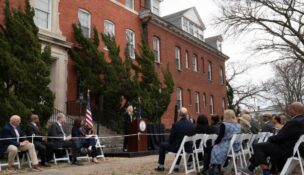Jefferson Lab seeks voluntary 7% workforce reduction
DOE launches new search for lab operator
Josh Janney //August 22, 2025//

Jefferson Lab Director Jens Dilling (right) speaks to media after giving Gov. Glenn Youngkin and Secretary of Energy Chris Wright a tour. Photo by Josh Janney

Jefferson Lab Director Jens Dilling (right) speaks to media after giving Gov. Glenn Youngkin and Secretary of Energy Chris Wright a tour. Photo by Josh Janney
Jefferson Lab seeks voluntary 7% workforce reduction
DOE launches new search for lab operator
Josh Janney //August 22, 2025//
SUMMARY:
- Jefferson Lab is seeking voluntary resignations from 7% of its workforce (about 65 employees)
- Restructuring emphasizes emerging fields like data science and artificial intelligence
- Gov. Glenn Youngkin, Secretary of Energy Chris Wright visited lab to promote President Donald Trump‘s “One Big Beautiful Bill”
Jefferson Lab Director Jens Dilling confirmed Thursday that the lab wants 7% of its workforce to voluntarily resign by the end of August.
WHRO reported last week that Dilling told employees that the Thomas Jefferson National Accelerator Facility, commonly known as Jefferson Lab, would need to reduce its workforce as part of a restructuring plan necessary for its future. The Newport News-based research facility is seeking approximately 65 workers to agree to resign by Tuesday.
During a press conference held after Gov. Glenn Youngkin and U.S. Secretary of Energy Chris Wright toured the lab, Dilling confirmed that WHRO’s report was accurate. The lab opened a “voluntary separation program,” he said, and it will take “full advantage of the people that are ready to step up.”
“There’s still time left for people to step up,” Dilling said. “It is a time where people are talking. We’re taking every single one of those people serious. It’s not about statistics; it’s about people. So it’s a case-by-case discussion, but it is going OK.”
If the lab doesn’t reach its goals by the end of August, WHRO reported, its leadership will implement a plan for employee layoffs in January. Dilling, who took over the lab director role from Kimberly Sawyer on June 30, said the restructuring includes a focus on emerging fields such as data science and artificial intelligence, according to the report.
DOE contract decisions
Also at the conference, Wright elaborated on the decision the Department of Energy made earlier this year to cancel its search for a new operator and manager of the facility, stating that it was part of a broader push towards efficiency.
Jefferson Science Associates, the current operator, was initially supposed to have its contract expire at the end of May. In February 2024, under President Joe Biden, the DOE initiated a competition for the selection of a management and operating contractor for Jefferson Lab and issued requests for proposals in July 2024. According to a presentation from an informational meeting in March 2024, the Energy Department had hoped to award the contract in early March.
But the DOE canceled the contract search in February. “The cancellation is necessary because key elements of the solicitation’s statement of work and evaluation criteria do not adequately reflect or align with the priorities of the current administration, as outlined in several executive orders issued by President Trump,” the notice read, without specifying which orders. Since taking office Jan. 20, the president has issued hundreds of executive orders, many of which roll back Biden’s priorities, including initiatives involving DEI and renewable energy.
In March, Wright approved a 12-month extension of the contract for Jefferson Science Associates to continue managing and operating the Jefferson Lab in Newport News. And in July, Jefferson Lab issued a new competitive solicitation for the operator of the lab, with offers due Oct. 3.
Wright was asked on Thursday what was in the original proposal that did not align with the Trump administration‘s goals. Wright said he “won’t speak to the details of that,” adding that the goal of the administration is to make science “more efficient.”
“Government just tends to do things less efficient than the private sector, and we’re here to change that,” Wright said. “The first thing I did in my first two weeks in the new role was have all the lab directors come to D.C. and talk to them, and then they prepared a list for me. What are the things I can do to remove bureaucracy and make your decision-making more efficient?”
He spoke of wanting to bring “business principles” to the lab’s operation, and said lab directors “have embraced [the approach] and run with it.” While it’s essential to “deeply cut” government spending, he added, “you won’t see any meaningful cuts to national labs across the country.”
Touting Trump’s agenda
Youngkin and Wright’s visit to Jefferson Lab also served a political purpose — to promote President Donald Trump’s One Big Beautiful Bill Act, which was signed into law in July. Youngkin discussed the legislation with manufacturing and energy business leaders during a roundtable discussion, most of which was closed to media.

The promotion of the bill is part of a broader recent effort by Republican lawmakers to sell voters on the new law, which is Trump’s most significant legislative accomplishment.
The Wall Street Journal conducted a nationwide poll in July, which showed that a majority of voters oppose the bill —with 52% against and 42% in favor. Most respondents said they believed the legislation benefits wealth and larger corporations, but hurts the economy, the middle class and poor. These respondents include people relying on programs like Medicaid and food assistance, which had funding cuts made to offset the law’s tax cuts.
Youngkin’s visit focused on the benefits of the legislation. He touted its 100% expensing of manufacturing and construction costs, which he said is a “giant incentive for folks to build today,” citing AstraZeneca’s recently Virginia development plans as an example.
What’s next?
According to WHRO, Jefferson Lab will make final decisions on voluntary resignations of lab employees by Sept. 24, and those approved to resign will exit by Oct. 15. Those who leave — either voluntarily or involuntarily — will receive severance pay of up to $50,000, depending on their length of service with the organization. According to the report, Dilling said the plan was developed internally and not tied to federal budget cuts.
“This voluntary separation gives us the opportunity to focus on the things that are most important to us — [to] support our mission [and] support the administration,” Dilling said Thursday. “And it is going very well.”


















